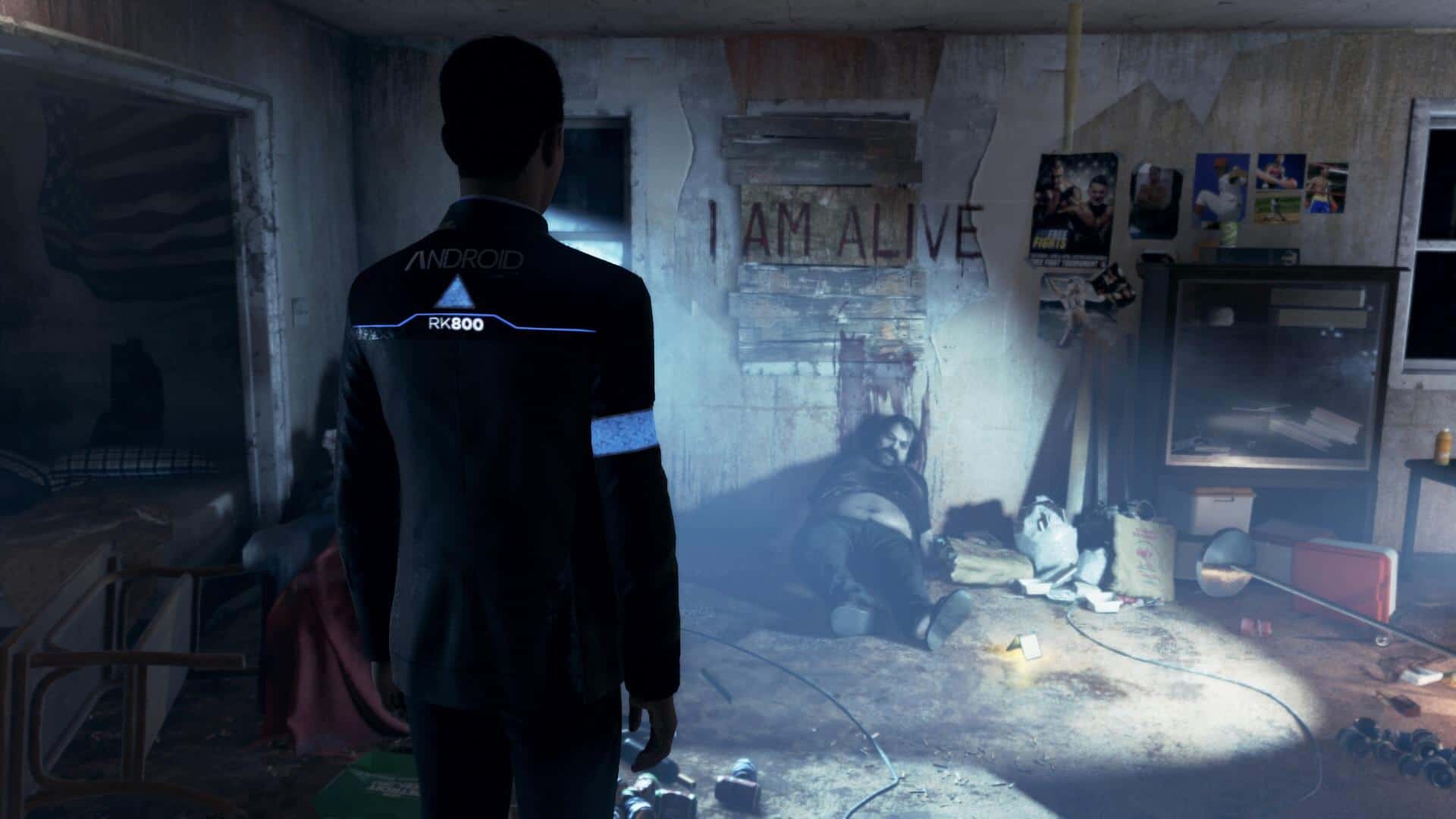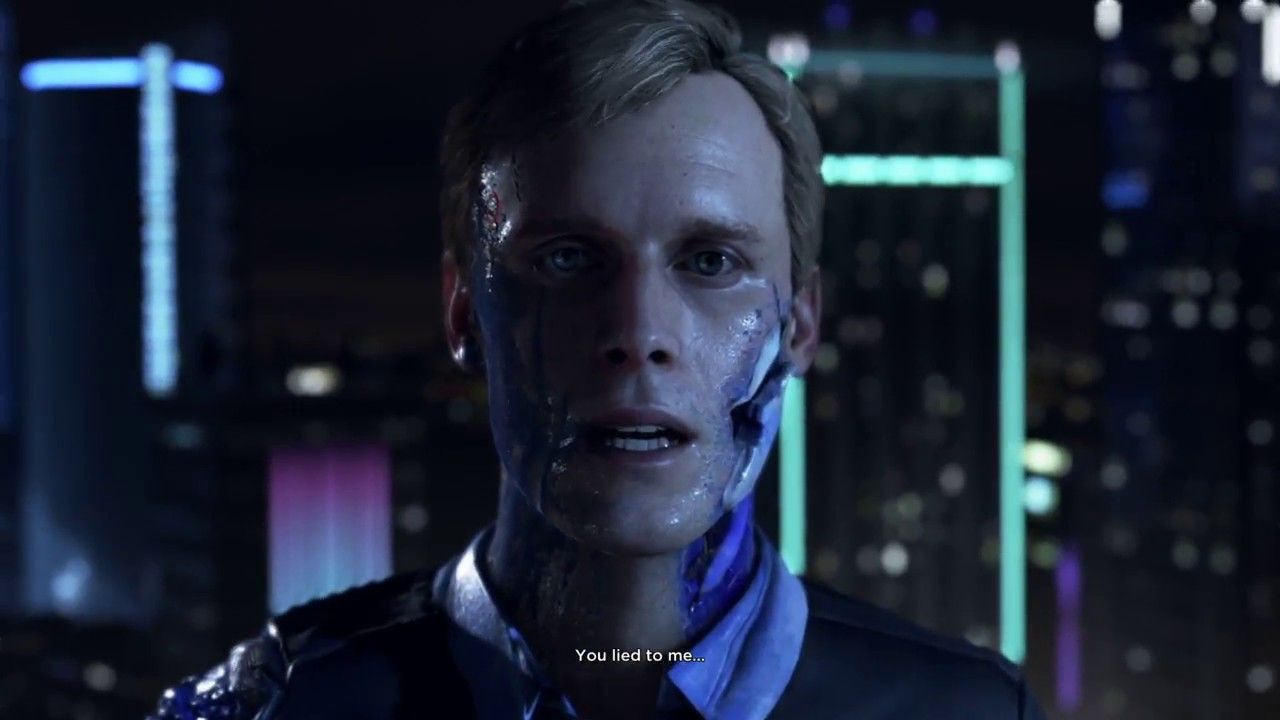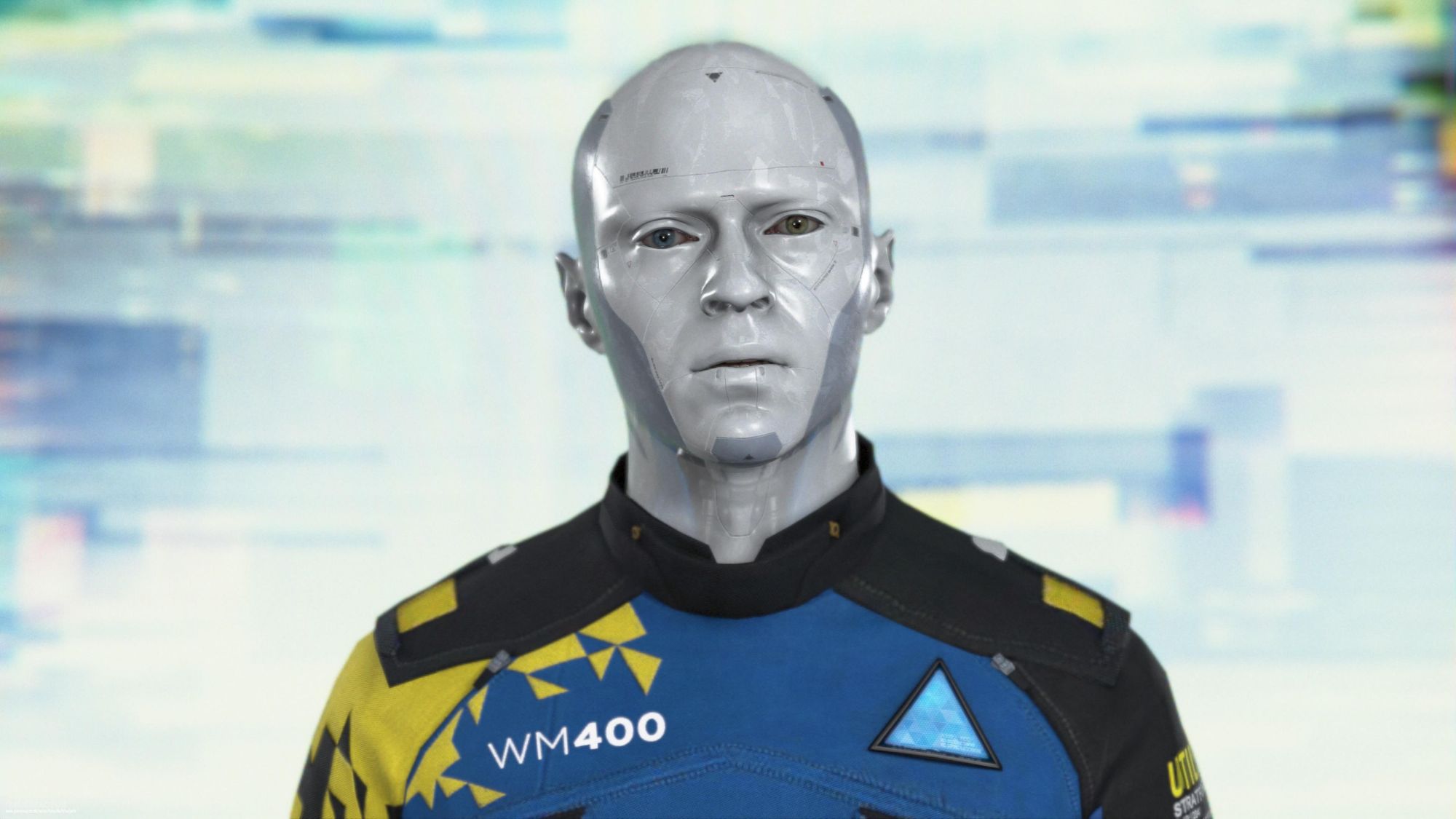Detroit: Become Human is Both Brilliant and Just Shy of It
Could the vaunted game have achieved more?

From the smallest of details to the greatest of choices, Detroit: Become Human's flowing and branching story progression is as stunning and frustrating now as it was in 2018.
It's a fascinating look at decision-based gameplay, forcing players to make tough calls at crucial points to either save or kill their characters. As an experimental game, it shines, but the novelty of choice is bogged down by a story that tries too hard to be too many different things. The, at times, heavy-handed exposition in Quantic Dream's Detroit: Become Human is part of its charm, but I can't help but wonder if its moral exploration might not have been utilized to a more effective degree.

There is a clearer narrative thread in the story of Detroit: Become Human than the game wants you to believe. You open in an elevator, flipping a coin along your fingers, the back of your jacket lit with ANDROID. The doors open into the sterile hallway of an apartment and you are referred to as the negotiator on-site. No context, completely in media-res. A glance to the right reveals photos of a family and a look to your left reveals a fish that has fallen from its aquarium tank onto the polished floors. Your first action is to bend down to it.
Your second action is a choice: you can either save the fish or you can leave it to die. At first, I thought this was a fun little introduction to the game's choice gimmick, but after my first playthrough, I realized that it was far more; its inclusion is illustrative of the subtler approach to the story that I wish the entire game had adopted with more confidence.
I'm a bit late to the party in discussing Detroit: Become Human, in that I just finished my first playthrough in the summer of 2022 and the game was released in 2018. But it's included in the PS5 essentials collection as well as the PS+ game catalog, so it felt like the right time to finally give it a go.
I'm a huge tech-science fiction fan, and the evident influence of Blade Runner and I, Robot let me know exactly what I was getting myself into. The first chapter's hook is beautifully effective, but after a few more hours I was so fully invested in these characters that I was staying up far too late on work nights trying to cram all the story I could into my head. I hadn't felt this compelled to play a game in a long while.

Although it has its intended message (and it really likes to moralize it), Detroit is a game that functions best when it focuses on character interactions and the relationships that develop from them. It wants to tell a story with wide-reaching implications on class, discrimination, and what it means to be human. And if you play the "machine" way, on the futility of change, success, and...authoritarianism, I guess? Look, it's a bit clumsy with the execution. The best stories it tells are the ones between its characters.
Various ideas are relayed to you in a very straightforward manner, and the brutal or merciful choices you make design your future outcomes. These dividing ways of playing are all compelling for the mystery they offer. When we make a choice and see that little lock open, there's this rush of possibility that comes with trying to see where we might benefit from the outcome later. From a design perspective, it offers an absurdly addictive style of play in that there are countless outcomes and tiny emergent details that change in each playthrough based on characters you save, evidence you collect, and paths your choose to follow. But these are most impactful when played pretty straight, and Detroit's stories are so compelling that making the purposefully harmful decisions feels...well, very uncanny valley, almost.
Detroit: Become Human suffers from a unique form of ludonarrative dissonance, in that it posits full player control of the narrative while designing the game around a very particular sort of story. At times, this tug-of-war with narrative compulsion and player input is completely immersion-breaking, and as someone who adores story above all else, this was probably what I saw as the biggest pitfall of the game.
In the three characters of Connor, Kara, and Markus, we're presented with three overarching stories: Connor is the android sent by Cyberlife to catch deviants--androids who have strayed from their programming--and is partnered up with a once-decorated now-drunk detective named Hank; Kara is a domestic android who was previously destroyed by the man who bought her, and whose motherly instincts towards the man's abused daughter, Alice, lead her to escape with the girl; Markus has the most eventful (but not, I would argue, the most compelling) story, going from being the caretaker of an elderly painter to becoming the messianic figure of an android revolution. These stories are clearly the ones that Quantic Dream wanted to tell, and yet there are myriad endings that involve things like Kara abandoning Alice, Connor letting Hank commit suicide, and Markus abandoning his revolution to save himself.
It isn't that these "other" endings are necessarily bad (in fact, some of them can be quite resonant), it's just that they run contrary to the empathetic reaction the game is clearly trying to elicit from its audience. We are beaten over the head with imagery of android abuse, and constantly faced with decisions that seem to be prodding us with an "are you sure?" sort of hesitancy, as if we might at any moment make a 180 decision that shifts the entire focus of the game.

Normally this would be interesting, but so little time is spent exploring the real details of these myriad consequences that they feel too unsatisfying. There might be a dramatic sequence of events that lead to the same cutscene as a previous playthrough we had where we made drastically different choices, forcing us to reconcile with the direction the game clearly wanted to take.
For example, you can see that having a good relationship with Alice fosters a better feeling of connectivity to Kara's whole story, which is advertised to be about breaking from her past and her abuse to become her own person. Connor's internal clash between his need to follow his orders and his growing friendship with Hank illustrates his slow devolution into the very thing he hunts (this is, if it's not already evident, my favorite part of the game). Markus's character feels the most egregiously unrealized, in that his impressionability creates odd situations where it feels out of character for him to choose either of his presented options.
There is one such instance towards the end, where Markus--whose actions have been peaceful up until that point--can decide to shoot a newly deviant Connor who has come to them for help and guidance. If you've played Connor up until this point as a good boy who has never done anything wrong in his life ever, it feels abrupt and awful if Markus chooses to shoot him. It fails to even address deaths like this in later chapters, resulting in these weird, disjointed versions of events that feel emptier.
Sure, maybe Connor's death by Markus's hand in this instance can be justified by the leader's anger at having so many of his people killed on Jericho, but there are other instances, such as a pretty forced romance with North, that make it feel like no matter what you chose, things will always end up a certain way. And honestly, pushing Markus from this story completely at this point leads to a more compelling North, but the trade-off is a more tragic end.
And that's the thing--you can kind of doctor the game to what you want, but the trade-offs are often estranged from the choices that lead us there. It feels like we're missing pieces.
The moralizing itself feels empty at times because, after the hours we spend seeing android abuse and being told to feel sorry for them, we can choose to go rogue and burn everything down. Not only that, but in so doing you can see the pattern of what seems like options to get back on track on how you're supposed to see the story play out. Snidely ignoring these little nudges towards the plot gives us a false sense of ownership of the narrative. I understand that most of these points of divergence can be justified, but for me, it was part of what made Detroit's more brilliant ideas feel so wasted.

I remember having a difficult time trying to slowly nudge Connor to deviancy in a way I felt satisfied with on my first playthrough. I wasn't entirely sure how much time I had to do that, and so I made many of the decisions that a machine-based Connor would at first, thinking that I was going to watch his devolution happen more slowly.
Well, no. Turns out I didn't succeed at some very vital chapters of the game, which resulted in my early decommissioning. I did, in the end, get my relationship with Hank to "friend", but it didn't affect the outcome. I had to finish the story as Markus, who led a peaceful victory with North; and Kara, who crossed the border to Canada via boat only to lose Luther and then Alice too. Markus's story offered glimpses once more of a brilliant game. The constant struggles, the ability to say "fudge it!" and choose violence--it worked. But it was in Kara's story that I found the most meaningful segment.
At the end of it all, for Kara, I was presented with an option to choose to steal bus tickets or return them, and I chose what I thought was the most moral option. My thinking was karma and all that, but what happened was that I lost everything because of that choice. It was this slight spiral of events that gave me a glimpse of what the game could have been if it had relied less heavily on being so upfront with its message and more on the decisions that make or break us.
Not keeping those tickets actually made me really reflect on the implications of perceived selflessness, and how sometimes we have to act in our best interests, especially if those interests involve people who depend on us to live. I call these moments the "bus tickets" moments, or points in the story where the narrative doesn't ask its characters to make dramatic decisions but gently nudges them towards these hard and unsuspecting ones. Just like the fish at the start. For a Kara grappling with her newfound humanity, this, more than anything, shined a light on the difficulty of living and the journey towards a right answer, even if there is none.
When Detroit relies too heavily on explaining the very evident themes, it staggers, but it doesn't need to tell us what it's already shown us. We've spent the game understanding the struggles of androids, so showing us over and over again what androids go through doesn't give us a wider frame of context, it becomes an abuse of player sympathy. And if we chose to play a more morally grey or outright violent route we still see glimpses of what the game wants us to do. It's the overuse of the shoot or spare dilemma that robs us of other, more interesting choices. We don't need to be constantly asked if we're making choices that are very obviously wrong or right. We needed more bus tickets moments.
And yet, as soon as the credits rolled on my first playthrough, I smashed the New Story button, this time with the hope of seeing everyone through to the other side. This involved a bit of cheating, of seeing which decisions lead to which outcomes. I got to see Connor go deviant and join the revolution in a move that was decidedly more exciting than what I had gotten and got to see Kara, Luther, and Alice to Canada without sacrificing anyone.

I know you can fail everything, and this makes 100%-ing the game more fun, in that there's hilarity to watching your characters make dumb-ass decisions when you don't click buttons, and making the worst possible choices when presented with the option to. The fact that Hank can get increasingly frustrated with each Connor's death is pretty funny until you realize that letting Connor constantly die decreases your relationship meter with Hank because you're treating yourself like a machine and, in some ways, reminding him of the loss of his son over and over again. You can also do everything right and still end up shooting Markus in the end as Connor because you failed to locate your "backdoor" and free yourself from Cyberlife's control. But these moments feel like parodies of the broader, of being purposefully acute in their absurdity.
What's so frustrating about Detroit is that there are still countless questions poised in the game that are never answered, there are threads that are cut short and left untended, and none of the endings fully satisfy any of them.
At one point, it's revealed in a single clue that Markus was a gift to the painter Carl from Elijah Kamski, founder of Cyberlife, intended to be the impetus for this revolution. But that isn't shown in-game with anything outside of a reference, the revelation--which should have been a big one--feels muted and pushed to the side. So much so that, as far as we know, Markus doesn't even know it.
We have dealings with Elijah Kamski later on as Connor, in that we visit him at his compound in a late-game move that feels like it should have been their first. Kamski's shown to be a recluse who lives in a cold mountain home with a series of duplicate androids called "Chloe", who lounge in his gruesomely red-tiled pool. It's all very tech-bro with a vision and the ego and means to manufacture it.
But who is this Chloe? Who knows! She's the android we get as our UI on the menu, but we know nothing else about her. If you kill all the characters really early on you get a special ending where Kamski basically states that androids are never going to be people, which is a fun little glimpse at the game's goading of nihilism.
But there is so much left unexplored that it hurts. Who is rA9, the name we keep seeing scrawled on walls and talked about as if it's a god? No one knows! It's never addressed, never really answered. Then there's the matter of red ice, a drug that contains thirium--the "blue blood" that pumps through androids--and a huge factor in many of the deviant cases. Alice's abusive father is high on the stuff, Connor's first case is an android whose owner was on it, and Hank blames androids (and humans too, I guess?) because his son died when an android failed to properly perform a life-saving surgery that a human doctor high on red ice should have performed. The fact that it contains what is essentially android blood leads to nothing at all. There's a pending war in the Arctic over resources, constantly discussed on the news and on the tablets, but it's never really meant to be anything but background noise. There's unrest due to androids taking over jobs. Poverty is still really visible. Some of this window-dressing is fine, but there's too much of it that feels like it could have been utilized as more.

I know it'd be impossible to create a sequel, considering there is no real "canon" ending, but the potential for the characters was so vibrant and compelling that I could spend countless more hours exploring them. We are getting a manga in the near future, but it doesn't quite scratch the itch. Detroit: Become Human is fascinating because of its current characters. And honestly, what part of my soul do I have to sell to see more of Hank and Connor's buddy cop, father-son dynamic play out across a series of new missions?
Detroit: Become Human is so frustratingly close to perfect that I can't help but love it, both because of and in spite of these imperfections. It's got a lot of heart. And, for all the crap I'm giving it, I do this from a place full of surfeit affection.
Each time I press New Story, I welcome that shot of Connor in the elevator, flipping the coin between his fingers. That familiar sense of anticipation sweeps me in immediately: the tense music, the stark black decor. Then we're back in that apartment hall, presented with the option to put the fish back in the tank. I do, and that small little software instability flashes in the corner of my screen. Oh, I realize, this was Connor's first act of deviancy.
If only there had been more.
